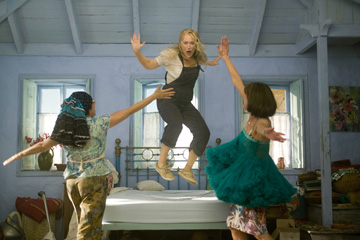The 66th Annual Golden Globe Awards
January 12, 2009

The Globes were pretty lively for an awards show, an antidote to the stuffy Oscars, and a welcome return after last year’s bizarre press conference held in the wake of the WGA strike. Rourke’s speech was one of the highlights, as he was an obvious crowd favorite, and the only A-list star in attendance who would thank his dogs. As a contrast, Colin Farrell, winner for the underrated In Bruges, made a point to thank his lawyer, for obvious reasons.
A looser atmosphere allowed for some genuinely funny moments in the midst of the traditionally canned banter from presenters. Ricky Gervais’s admonishment of audience members’ failure to shut up during his presentation was a highlight, and Sacha Baron Cohen’s barb at Madonna ex Guy Richie would have killed had he not been cracking wise to a room full of insiders. And if Barack Obama’s election wasn’t good enough on its own merits, now it’s been revealed that the Obama win means that Tracy Morgan gets speak on behalf of 30 Rock at all future awards shows. This is a change I can believe in.
As for the awards themselves, the Globes were kind of a mixed bag. I don’t really understand all the love for Slumdog Millionaire (which won four awards, including Best Drama). Slumdog is a decent film, but for most of its running time feels like an exercise in craft and a highly calculated tug at the emotions than a real narrative. It was a relief, however, to see The Curious Case of Benjamin Button go home empty handed.
The film acting winners seemed to be deserving for the most part, with Rourke and Farrell (whose co-star Brendon Gleeson was equally deserving) taking the Best Actor awards in Drama and Comedy, respectively, and Heath Ledger’s turn in The Dark Knight expectedly winning the Supporting Actor trophy. In the Actress categories, Kate Winslet took home both awards for which she was nominated (for roles in The Reader and Revolutionary Road), while the (for once, actually) deserving Meryl Streep was denied for her role in Doubt, the first evidence in years that Streep is really the foremost actress of her generation.
On the TV side, Mad Men and 30 Rock took the series prizes, and being that those are the best two series on television, you’ll find no debate from me. 30 Rock‘s Tina Fey and Alec Baldwin cleaned up the Comedy acting awards for the second year in a row. The acting prizes on the Drama side were questionable to say the least. Jon Hamm (last year’s winner for Mad Men) was denied in favor of Gabriel Byrne of In Treatment, which, rightfully, no one but the Hollywood Foreign Press Association even bothered to watch.
The biggest bonehead call of the night, though, goes to Anna Paquin’s win for True Blood. This despite the fact that Paquin’s performance is a major weak link in a series that, despite early evidence to the contrary, proved to be a solid, if horribly flawed, addition to HBO’s roster. Paquin, though she’s a recognizable name, was not a safe pick like Byrne was. The safer picks in the Best Actress category would have been Sally Field (for Brothers and Sisters) or Kyra Sedgwick (The Closer). Paquin’s choice was bold and unexpected; it was just wrong. The mentos and manatees house favorite in that category is, of course, January Jones of Mad Men, who it seems will never get her due.
All things considered, though, the Globes were a better watch than the Academy Awards figure to be. Thanks to Aronofsky, we’ll probably be watching that show on a ten second delay.
